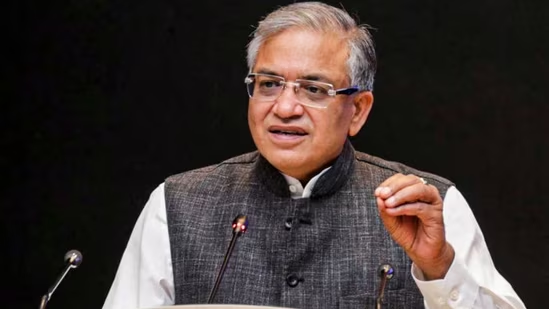CEC Gyanesh Kumar Hits Back: ‘ECI Stands Like a Rock, Allegations of Vote Fraud Baseless’
In a charged political atmosphere where every statement has the power to ignite national debate, Chief Election Commissioner (CEC) Gyanesh Kumar on Sunday mounted a strong defence of the Election Commission of India (ECI).
Responding to allegations of “vote chori” (electoral fraud) levelled by Congress leader Rahul Gandhi, Kumar asserted that the ECI’s processes remain transparent, robust, and above partisan influence—standing as a guardian of the world’s largest democracy.
Kumar dismissed the Congress leader’s presentation on alleged manipulation of electoral rolls as nothing more than a “wrong analysis” based on inaccurate data.
He categorically clarified that the data being projected in Rahul Gandhi’s “PPT presentation” was not supplied by the ECI.
Taking a combative stance, the CEC challenged Rahul Gandhi to submit an affidavit with proof of his allegations within seven days—or apologise publicly to the nation for misleading people.
“India’s democracy is built on trust, participation, and an inclusive process. The Election Commission fearlessly stood, stands, and will continue to stand like a rock with every voter, irrespective of religion, caste, or community,” Kumar declared in a press briefing.
Countering Rahul Gandhi’s Charges, Point by Point
In his August 7 press conference, Rahul Gandhi alleged large-scale voter roll manipulation by the ECI in collusion with the ruling BJP, using data from the Mahadevapura assembly segment in Karnataka’s Bangalore Central seat as evidence.
The Congress leader highlighted instances of duplicate names, voters registered with “house number zero,” and multiple voters assigned to a single small house.
The CEC directly addressed these charges one by one:
1. On “House Number Zero” Allegations
Kumar explained that millions of homes in rural India and urban slums have no official house numbers. In such cases, the ECI assigns a “notional number,” often zero, so that no voter is left disenfranchised.
“There are citizens who live under bridges, beside lampposts, or in unauthorised colonies. Our priority is to ensure they are not excluded from the democratic process.
Assigning a notional number is a way of empowering, not excluding,” Kumar said. He emphasised that a proper address is not a prerequisite for voting—only nationality, age (18+), and residence near a polling booth are essential.
2. On Duplicate Entries in Voter Rolls
Rahul Gandhi flagged the issue of duplicate names, hinting that it was part of an orchestrated fraud. Kumar countered sharply, stating that while names may occasionally appear in two places due to shifting residences or clerical errors, casting a vote twice is a criminal offence.
“Even if a voter’s name appears in two places, the act of voting twice is punishable. Allegations of systematic duplicate voting must be backed by evidence. When asked for proof, none was provided,” the CEC said, challenging the Congress to produce hard data.
3. On 22 Lakh Reported Deaths in Bihar
The Congress claimed that 22 lakh names were struck off the rolls in Bihar within six months due to deaths, hinting at foul play. Kumar clarified that this figure represented cumulative unreported deaths spanning 20 years, because the last Special Intensive Revision (SIR) of voter rolls in Bihar was conducted two decades ago.
“Routine summary revisions only add new voters and remove those deaths reported by families. But a door-to-door SIR uncovers decades of unreported deaths, as in Bihar. This ensures accuracy, not fraud,” Kumar explained.
A Defence of Institutional Sanctity
At a time when public trust in institutions is constantly tested, the CEC underscored the sheer scale and integrity of India’s democratic process.
With nearly 90–100 crore registered voters, India conducts the largest democratic exercise in human history, requiring constant updating, scrutiny, and verification.
“Maintaining an electoral roll of such magnitude is not without challenges. But to misrepresent these challenges as deliberate fraud is not just misleading, it’s damaging to the faith of ordinary citizens in democracy,” Kumar said firmly.
In a veiled but unmistakable reference to Rahul Gandhi, he added: “One needs to have the stomach to listen to and understand the truth.”
By throwing down the gauntlet—asking Rahul Gandhi to either prove his charges under oath or retract them—the Election Commission has not just defended its credibility but also attempted to draw a clear line in the sand: India’s electoral process is non-negotiable, and its sanctity must not be undermined without evidence.
#ElectionCommission #CEC #GyaneshKumar #DemocracyInIndia #ElectoralIntegrity #VoteSanctity #IndiaVotes #WorldsLargestDemocracy #ECIResponse #RahulGandhi #VoteChoriDebate #LokSabha2024




